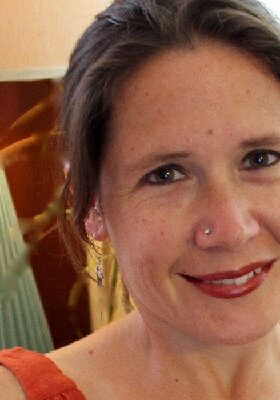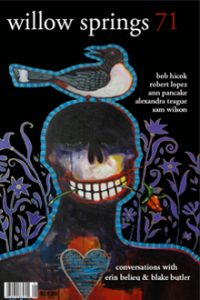
About Alexandra Teague
Alexandra Teague’s first book, Mortal Geography (Persea 2010), won the 2009 Lexi Rudnitsky Prize and the 2010 California Book Award for Poetry. Her poetry has appeared in Best New Poets 2008 and Best American Poetry 2009, as well as journals including The Missouri Review, Prairie Schooner, New England Review, and FIELD. She earned an MFA from The University of Florida in 1998 and was a 2006-2008 Stegner Fellow at Stanford and a 2011 NEA Fellow. She is Assistant Professor of Poetry at University of Idaho and an editor for Broadsided Press.
A Profile of the Author
Notes on “Transcontinental”
“Transcontinental” came out of research that I was doing about mid-to-late 19th century Westward expansion for my manuscript-in-progress, The Wise and Foolish Builders. The project originally began with my interest in Sarah Winchester’s story: her building—supposedly out of guilt over deaths caused by the Winchester rifle—a six-acre house in San Jose, California. While imagining her move from Connecticut to California in the 1880s, I became interested in the transcontinental railroad, which had been completed only a little over a decade before. At some point in my internet research, I ran into the story of Theodore Judah, who was one of the first great champions of the transcontinental railroad’s feasibility, and the one who plotted the northern route through Donner Pass that was eventually used. The idea of his being called “Crazy Judah” appealed to me—partly because Sarah Winchester has gone down in history as a crazy woman guided by ghosts to build her house, and partly because I’m interested in how often the architects of new plans are considered crazy at the time, then accepted, and then largely forgotten by history. So I started with a poem called “Crazy Judah,” and research in Stephen E. Ambrose’s Nothing Like It in the World, and I quickly started discovering all kinds of quotations and ideas that needed their own poems. So I kept adding jottings for starts of sections, and pretty soon, I had ten sections that I worked and reworked off and on for about four months.
Notes on Reading
I feel extremely fortunate to be a poetry professor these days and to get to spend much of my time having conversations with students about books. This past semester, I taught a Techniques of Poetry course at University of Idaho, and the books we read for that class have undoubtedly shaped my thinking about poetry and this manuscript. I go through phases (such as summer break) when I often read in the mornings for a few hours and then start writing, but during the academic year, I really only get one writing day a week, so all the reading and discussing I’ve been doing tend to be somewhere in the back of my mind when I start writing. I usually don’t consciously try to employ techniques that we’ve been discussing, but they have a way of showing up or helping me think about new angles for approaching subjects. Larry Levis is one of the poets whose work I’ve most returned to since I discovered him in 1994. And he’s someone we’ve been reading this semester as well, and who continues to influence me. Mark Doty is a contemporary poet I return to, and really admire (particularly Bethlehem in Broad Daylight) for his control of syntax and narrative. Phillip Larkin and Elizabeth Bishop were two of the poets whose work most shaped me in graduate school, and whom I still deeply admire. D.A. Powell’s Chronic has helped foster my recent thinking about colons. I’ve been reading, and returning to, a lot of books of historical poetry over the past few years as I’ve worked on this manuscript, including Gabrielle Calvocoressi’s work and Tyehimba Jess’s Leadbelly.


